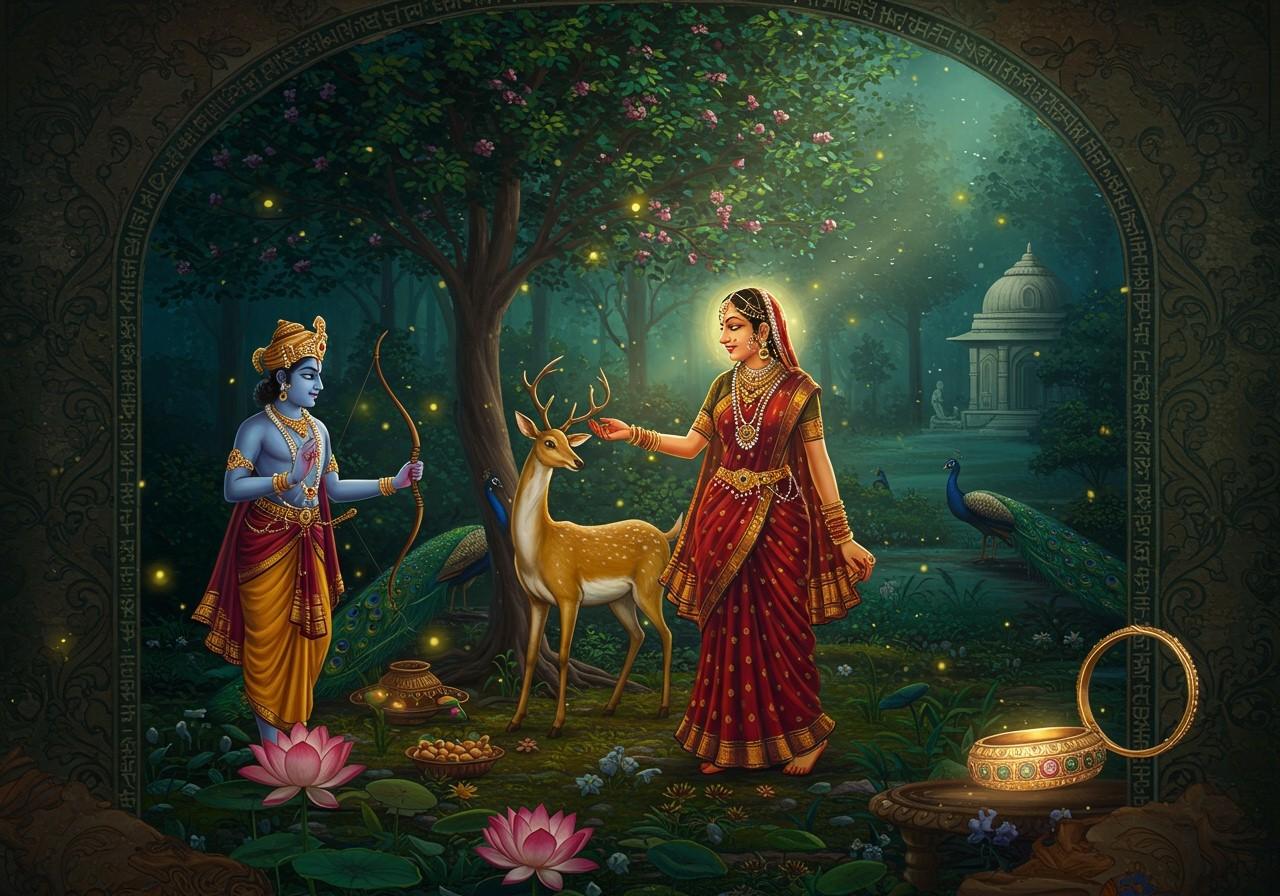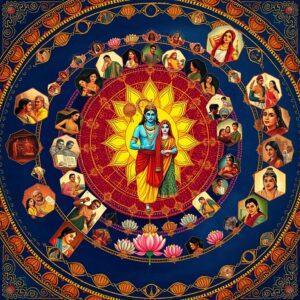
Abhijnanasakuntalam, written by the renowned Indian poet Kalidasa, is a romantic tale of King Dushyanta and Shakuntala. The play, originally in Sanskrit, translates to “The recognition of Shakuntala” in English. The story unfolds in the Book of the Beginnings (Adi Parva) of the Mahabharata.
Background
Kalidasa, often hailed as the “Shakespeare of India,” made invaluable contributions to Sanskrit literature. His other masterpieces include Raghuvamsa and Meghaduta. Abhijnanasakuntalam, meaning “The Recognition of Shakuntala,” is a seven-act play in the classical Sanskrit drama format. This centuries-old masterpiece has profoundly influenced Indian art, literature, and theater.
Plot Summary
The first act describes King Dushyanta’s encounter with Shakuntala during a hunting expedition in the penance grove of sage Kanva. The play concludes with the joyous reunion of the family, different in dramatization but similar in resolution to the version in the Mahabharata.
- Act 1: King Dushyanta, on a hunting trip, encounters Shakuntala, the adopted daughter of Sage Kanva, in the hermitage. A mutual attraction blossoms between them.
- Act 2: Back in his palace, King Dushyanta finds himself deeply smitten with Shakuntala, unable to forget her beauty and grace. He is torn between his royal duties and his love for her.
- Act 3: Dushyanta returns to the hermitage and marries Shakuntala in a secret ceremony. He gives her a royal ring as a symbol of his love and promise to return for her.
- Act 4: While lost in thought about Dushyanta, Shakuntala fails to greet the enraged sage Durvasa. He curses her, causing Dushyanta to forget her until he sees the ring again.
- Act 5: Pregnant with Dushyanta’s child, Shakuntala travels to the palace to meet him. However, due to the curse, Dushyanta doesn’t recognize her and rejects her, leaving her heartbroken.
- Act 6: Dejected and alone, Shakuntala finds refuge with Sage Maricha, where she raises her son, Bharata.
- Act 7: A fisherman finds the ring Dushyanta had given Shakuntala. Upon seeing the ring, Dushyanta’s memory is restored. He is reunited with Shakuntala and their son, Bharata.
Character Analysis
- King Dushyanta: The king’s character undergoes a significant transformation throughout the play. He evolves from a passionate lover to a responsible ruler, grappling with the complexities of love, duty, and the consequences of his actions. His journey reflects the challenges of balancing personal desires with royal obligations.
- Shakuntala: Shakuntala’s character embodies innocence, grace, and resilience. She transforms from a carefree maiden in the forest to a devoted wife and mother. Her unwavering love for Dushyanta and her strength in the face of adversity make her an admirable figure.
- Sage Kanva: The sage serves as a wise and compassionate father figure to Shakuntala. He offers guidance and support, nurturing her growth and helping her navigate the trials and tribulations of life.
- Sage Durvasa: Known for his fiery temper, Durvasa plays a pivotal role in the narrative. His curse on Shakuntala creates the central conflict of the play, driving the plot forward and ultimately leading to the reunion of Dushyanta and Shakuntala.
- Priyamvada and Anasuya: Shakuntala’s loyal companions, Priyamvada and Anasuya, provide unwavering support and friendship. They share her joys and sorrows, offering comfort and counsel during her difficult times.
- The Fisherman: The fisherman’s discovery of the ring becomes a turning point in the story. His role, though seemingly small, is crucial in triggering Dushyanta’s memory and setting the stage for the reunion.
- Sage Maricha: Sage Maricha offers refuge and wisdom to Shakuntala during her period of exile. He provides a safe haven for her and her son, Bharata, guiding them through their challenges.
Themes
- Love and Destiny: Abhijnanasakuntalam explores the powerful force of love and the intricate workings of destiny. The play portrays how love can transcend obstacles and how fate plays a significant role in shaping human lives. Dushyanta and Shakuntala’s love story exemplifies the enduring power of love despite unforeseen challenges.
- Memory and Recognition: The play delves into the importance of memory and the significance of recognition in human relationships. The curse that causes Dushyanta to forget Shakuntala highlights the fragility of memory and its impact on personal identity and connections. The eventual recognition scene underscores the restorative power of memory in healing and reunion.
- Duty and Dharma: Abhijnanasakuntalam examines the themes of duty and dharma (righteous conduct) through the actions of its characters. Dushyanta’s struggle between his love for Shakuntala and his royal responsibilities exemplifies the conflict between personal desires and societal expectations. The play explores the complexities of moral obligations and the consequences of choices.
Get Puja Essentials for a Shakuntala-Inspired Ceremony at Poojn.in
Inspired by the timeless tale of Abhijnanasakuntalam? Poojn.in offers a wide selection of authentic puja items to connect with the sacred themes of this classic Sanskrit drama. Enhance your spiritual experience with:
- Copper Kalash and Thali Sets: Elevate your traditional rituals with beautifully crafted copper kalash and thali sets. These items add a touch of authenticity and reverence to your puja ceremonies.
- Natural Flower Garlands and Offerings: Offer fresh, fragrant flower garlands and other natural offerings to express your devotion and create a serene atmosphere during your puja.
- Organic Kumkum and Chandan: Enhance your tilak ceremony with organic kumkum and chandan, known for their purity and auspicious significance.
- Handcrafted Diya and Incense Holders: Illuminate your sacred space with handcrafted diya and incense holders, adding a touch of artistry and tradition to your puja setup.
- Premium Quality Ghee: Use premium quality ghee for your sacred flames, ensuring purity and enhancing the spiritual significance of your rituals. Explore our collection of pure ghee and other puja essentials.
- Traditional Bell Metal Items: Discover traditional bell metal items, including bells, plates, and other ritual objects, to enhance the authenticity and sacredness of your puja ceremonies. Find exquisite bell metal items at Poojn.in.
Visit www.poojn.in or download our app for a complete selection of ritual items. We offer:
- 100% Authentic Products: We guarantee the authenticity and quality of all our puja items, sourced from trusted and verified sellers.
- Verified Sellers: We partner with verified sellers to ensure the quality and authenticity of our products, giving you peace of mind.
- Pan-India Delivery: We deliver across India, bringing the sacredness of tradition to your doorstep, no matter where you are.
- Secure Online Payments: Enjoy secure and hassle-free online payments, making your shopping experience convenient and safe.
- Expert Guidance: Our knowledgeable customer service team is available at 91 7908548235 to provide expert guidance on product selection and order support. We are here to assist you with all your puja needs.
Conclusion
Abhijnanasakuntalam is more than a love story; it’s a timeless exploration of love, duty, destiny, and the human condition. Kalidasa’s masterpiece continues to resonate with audiences, reminding us of the enduring power of love and the complexities of human relationships. This classic tale offers a profound journey into the heart of Indian culture and literature.


